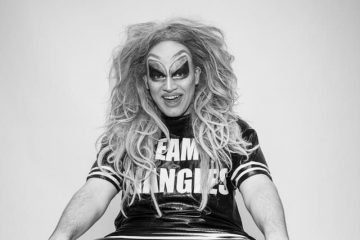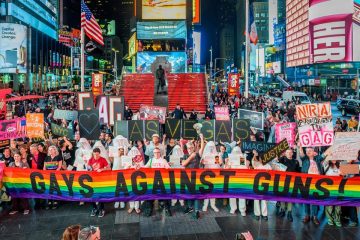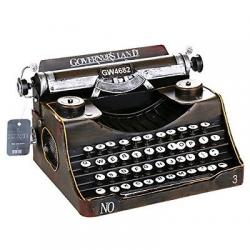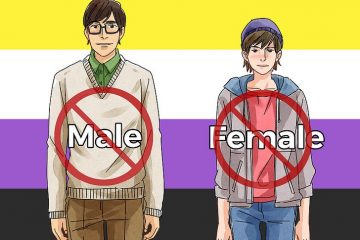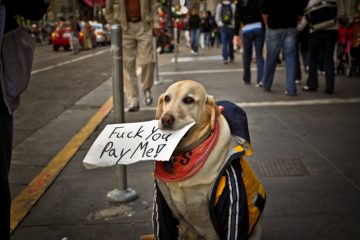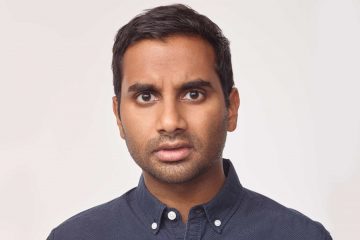What It’s Like Being Married to a Nonbinary Person in a Binary World

The Nonbinary Flag. Yellow represents people whose gender exists outside the binary, purple is those who feel their gender is a mixture or between male and female, and the black represents people who feel as if they have no gender. The white stripe represents those who embrace many or all genders.
Guest Post by Max Silver
We live in a world conditioned to believe there are only two genders: man and woman, boy and girl. Likewise, our minds are geared towards binary thinking-patterns. Everything is right or wrong, odd or even, yes or no, up or down, black or white. The grey area is often undefined, generalized, and overall lacking focus. However, there are more than fifty shades of grey. In fact, according to my partner, one might argue there are near-infinite possibilities on the color-spectrum, and while some colors might not be as visible to the naked eye as others, they are still there whether you see them or not, and even that is a statement through binary lens. For non-binary folk, it is not a question of whether they identify as male or female or both. Rather, they are free of the spectrum altogether, because gender-fluid is not constrained to a sliding-scale between two polar opposites.
As a cis white male married to a person who identifies as nonbinary, I initially found the concepts covered in this article difficult to grasp. This information is about my experiences by proxy, but it is mostly about my partner. They are the ones who first introduced me to the idea of gender outside the male-female spectrum, therefore, to give credit where credit is due, while I am an advocate, they are the source.
I first met my hyfe when they were 18. Back then they went by the pronouns she, her, hers. We drifted apart, and years later we got married in Las Vegas. When I married this person, they were not a bride, nor a groom, nor a combination of the two. I saw them as my lover. Still do. Whenever I tell my friends how I am married to a nonbinary person, the first question I usually get is “Are you nonbinary too?” No. I am not. However, I am in a genderqueer relationship.

image from this remarkable WikiHow
It should be noted that nonbinary terms differ from person to person. For example, not all nonbinary folks go by the preferred pronouns they/them. My hyfe goes by they, them, and gxrl. I go by he, him, and occasionally princess. Gender varies in individuals, and it shifts in many forms. A nonbinary person can dress high femme and still consider themselves nonbinary. A man can wear a dress and still be considered a man, because that is how he has chosen to define his masculinity. Hence, I am occasionally a princess. What we wear is not the same as who we are, nor is gender the same as sex. Sex is a biological process that involves genetic makeup borrowed from parents’ cells to shape your body’s reproductive-organs. Gender is a sense of being, often influenced by cultural references and societal norms, which transcends the physical form through expressionism. It is easier for those of us who are cis male or cis female to find depictions of ourselves in art, media, and literature, because that has always been socially acceptable. Queer communities have had to fight in order to express themselves in this country, and as for genderqueer folks who find the binary too limiting, it has been an uphill battle.
There are a number of social-barriers aimed to keep nonbinary people out. This includes everyday obstacles, such as public restrooms, job-applications and surveys that list only two gender options, even legal documentation such as passports, drivers’ licenses and birth certificates (a bill that has recently taken effect as of January 1, 2018 allows a third option for gender on drivers’ licenses and identity cards for California residents, which raises the question of why we even need the government’s permission to be properly labeled who we are in the first place, but that is another article.) This culminates to nonbinary folk being constantly misgendered, a microaggression which directly or indirectly is a form of bullying and violence. On top of that, nonbinary folk have been discriminated by certain LGBT and feminist groups. Under these circumstances, nonbinary folk are so marginalized they feel practically invisible. Yet, they have been here with us since the beginning, and it is about time for the rest of society to acknowledge them.
My hyfe was constantly misgendered as a “waitress” at a café they were working at in San Francisco… not only by customers, but by their co-workers as well. They did not reveal their identity to others for some time, because the institutions taking effect are so isolating that they feared rejection upon being found out. Misgendering someone is the same as name-calling them, and there are many people, especially those of older generations, who do this intentionally based on the belief that singular they/them pronouns are grammatically incorrect. Tell that to William Shakespeare, who wrote “There’s not a man I meet but doth salute me as if I were theirwell-acquainted friend”, in Comedy of Errors, Act 4 Scene 3, 1594, or George Chaucer, “And whoso fyndeth hym out of swich blame, theywol come up…”, from The Canterbury Taleswritten in 1392. Not to mention Charles Dickens, Lord Byron, Robert Louis Stevenson, Daniel Defoe, Lewis Carroll, F. Scott Fitzgerald, George Orwell, C.S. Lewis, and Jane Austen, who alone contributed at least 75 examples of singular they/them pronouns in English literature, listed right here.

image from this remarkable WikiHow
To assert grammar’s proper usage of they/them antecedents throughout the history of the English language is entirely missing the point of using words to communicate with one another on a mutually understood level. Language is a tool, like any other tool it should be updated. Just because your grammar-teacher taught you never to use singular they/them pronouns in middle school, does not give you license to mislabel someone’s personal pronouns. Those are meaningful words to them… to you it is a slight inconvenience because your ears are tuned to hearing a binary version of the English language. By refusing to change how you talk in respect to the identity of others, you are perceived as inconsiderate, inaccurate, lazy, and bigoted. Bigotry is a choice, whereas ignorance is merely lacking knowledge.
Admittedly, there is an age-gap here, as in this applies mostly to older generations than newer ones. When I told friends around my age about it, they understood. When I told my parents, they were accepting of my hyfe’s existence, but for the most part they resented the usage of singular they/them pronouns. Even their parents still use she, her, hers, and daughter, which are now considered dead-pronouns because they no longer fit my hyfe’s identity. I did not attempt to get my grandparents to understand the nonbinary gender as a concept at all. Perhaps this is because they come from an older world. I warn my fellow advocates that explaining to a ninety-year old Holocaust survivor how they are bigoted because they do not understand their granddaughter’s desire to no longer be referred to as such, is a conversation I would avoid at all costs. Sometimes, people get old, and they no longer want to hear the new ideas youngsters are putting out there into the world, because to them it is no longer their business. They are old. This brings me to my next subject, how nonbinary is falsely accused of being one of those ‘new ideas.’
Many people argue that this is just a fad, a new trend with no historical basis. On the contrary, wakashū lived during the Edo period of feudal Japan, two-spirits played a variety of roles in Native American societies, including weavers, potters, warriors, healers, shamans and spiritual leaders of the tribe, and “sistergirls” and “brotherboys” are distinctly recognized among indigenous communities of Australia. Here lies evidence that there have always been examples of gender that deviates from the binary systems currently in place.
It is a dangerous thing for the American mainstream-culture to see everything through a binary lens. Humans are not like coins. There are more than two sides of a person. You cannot divide our entire species up into “good” versus “evil.” We are complex, multi-faceted individuals, and that dichotomy becomes toxic when applied to every single thing. Any sentence that begins with this phrase: “There are only two kinds of people in this world…” is, to quote my hyfe’s candor, “bullshit.”

image from this remarkable WikiHow
My hyfe once applied to an ad on craigslist for a fair-priced apartment in Oakland. As they consider home to be a “sacred space” where one should feel safe and comfortable, they made sure to mention that they were nonbinary at the top of the e-mail. The creator of the ad, a woman of color and self-proclaimed radical feminist, reviewed my hyfe’s application and asked if they would not mind coming in for an interview. They talked about smoking weed, white supremacy, feminism and intersectionality, a term first coined by Kimberlé Crenshaw, which you can read more about in her essay right here.
This conversation went well. Days later, my hyfe received an e-mail with excellent news: They got the apartment! Just as my hyfe started gearing up for the move, they received a third e-mail that said “Hey…my gay roommate told me that you’re non-binary. I did not see that on your application and I’m not willing to change my language. It’s absurd and it makes me sad to see so many women who are disempowered by internalized misogyny that they don’t want to be considered women anymore…” My hyfe responded to this e-mail as politely as they could and went out of their way to explain the intricacies of their identity, as if that were up for debate, but the woman remained adamant: she did not want to change her language.
This is what discrimination against nonbinary folks looks like. This is why they feel invisible, because even people that consider themselves “intersectional” are capable of prejudice. It does not matter if you are POC, queer, or intersex… if you discriminate against someone based on gender, that means you are not an intersectional feminist. T.E.R.F.s, (Trans-Exclusionary-Radical-Feminists), are not feminists, because rather than supporting equal rights for all they advocate violence against transgender people.
In short, being married to someone who is nonbinary is a lot like any other relationship… except that they are constantly struggling for recognition in a culture that misgenders and discriminates them, or simply does not know they exist. However, they do exist, just like colors unseen by the naked eye, and it is intrinsic to fostering a community with equal rights and fair representation for all that we acknowledge nonbinary existence and begin to unpack the toxicity of the binaries in our culture.


